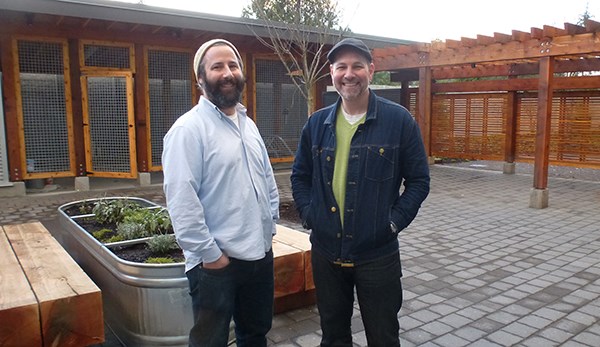A large number of clients at Coquitlam’s homeless shelter have been able to move on to treatment or more permanent forms of housing, according to data from the operator of the facility at 3030 Gordon Ave.
RainCity Housing said that of the 120 people who have come through the doors since the shelter opened last December, 30 (25%) went on to treatment or detox while 28 (23%) found market housing. Another 24 (20%) moved on to the supportive housing at 3030 Gordon and 10 (12%) were able to receive help from a family member.
Bill Briscall, RainCity’s communications manager, said the numbers show the shelter has worked to get homeless people off the street and into housing.
“We are happy with the outcomes,” he told The Tri-City News a day after presenting the findings to Coquitlam council. “Over half the people are getting into housing, which is great given the shortage of housing.”
That still leaves 23% who were not able to use the shelter as a means of finding a permanent place to live. The numbers show that 10 people (8%) moved on to a different shelter while the situations of 14 people (12%) are unknown and four (3%) ended up in jail.
Briscall said the data has been helpful in showing where the needs are for the facility and how it can allocate resources.
For example, over the last year, shelter staff have seen a shift in the average amount of time clients have been on the streets. Over the last six months, 43 (62%) of the 68 shelter users said they were homeless for less than a year, with 23 of those saying they were homeless less than a month and 15 for less than a week. This is a shift from the first six months of the year, when Briscall said shelter clients mainly consisted of people who had been on the streets for a longer period of time.
The early outreach, he added, is helpful in getting people back into a stable housing situation before they became entrenched in homelessness.
“For those who have been homeless many years, it is hard to get them into a shelter,” he said. “Those folks that were homeless the smallest amount of time get housed faster because they are going through a different experience.”
The data found that 17% of shelter clients have been homeless for one to two years and 15% fall into the two- to five-year range. Another 3% said they had been homeless for five to 10 years and 3% said they had been living on the streets for more than 10 years.
“It is a different population than what we were anticipating,” said Catharine Hume, the co-executive director of RainCity Housing during a presentation to Coquitlam council on Monday. “I think we were much more anticipating the types of people we saw in the first half of the year.”
The average age of a shelter client has also fluctuated since the facility opened last December but, overall, 41% were listed as 50 and older while 46% are in the 30 to 50 range and 13% are under 30.
The majority of the shelter users come from Coquitlam (48%), followed by Port Coquitlam (26%) and Port Moody (2%). Another 5% listed their home town as the Tri-Cities and 19% were from outside of the area.
The Gordon shelter and transitional housing facility will mark its first year of operation on Dec. 15.
@gmckennaTC



